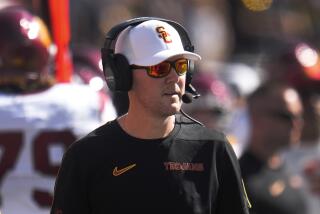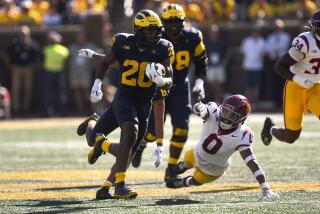John Wooden was a man of his time, and for all time
“Forget his accomplishments, he’s a great man.”
--Jerry West, on John Wooden
Appropriately, John Wooden passed away with the NBA Finals in town and the basketball world already focused here, even if he was from a place and time so far away, it could have been in a parallel universe.
Wooden doesn’t just transcend college basketball, but the game and games in general.
If he looked like a charming anachronism, he looked the same way in 1948, driving up in the family Mercury with Nell and the kids after stopping at the Grand Canyon and Carlsbad Caverns on the way from Indiana.
Local sportswriters, used to coaches who’d take a drink, considered him a teetotaling Sunday school teacher with a whistle.
The reverence came later when he started winning titles, but John Wooden was always John Wooden, wherever he was, whatever went on around him.
The better you knew him, the more you admired him. That, not 10 NCAA titles in 12 years, was his greatest accomplishment.
If Wooden did as much as anyone to start the game on the path to today’s splendors, it’s like Leadbelly’s line in “Rock Island Line”:
“Jesus died,
“To save our sins,
“Glory to God,
“We’re gonna need him again.”
The world Wooden wrought is unrecognizable with post-teens like Kobe Bryant or LeBron James awakening to find themselves kings of crazed kingdoms.
James won his second MVP award in a row as Orlando Coach Stan Van Gundy noted he could win the next 10, before the Celtics upended the Cavaliers with LeBron playing much of the series left-handed, as if he was hurt, which he was.
To find James today, you have to dig through mountains of garbage and insults (quitter, mercenary, etc.).
Of course, no one really knows, so there are two possibilities.
A) After seven seasons as this never-say-die runaway train, he quit for whatever reason.
That’s the consensus view.
B) Doing all he did entitles him to the benefit of the doubt until someone proves he wasn’t hurt.
Well, I think so, anyway.
Meanwhile, Bryant, dropped to a distant No. 2, or No. 3 behind Kevin Durant by Rolling Stone’s Matt Taibbi, seeking someone to surpass Bryant (the “demented three-faced narcissist”), is suddenly, quote, having his best postseason!
Kobe has been a monster, averaging 29.5 points, 5.2 rebounds and 6.2 assists . . . like the 30-5-5 he averaged in the last three.
If Bryant and James have iron wills, both aspire to Michael Jordan’s commercial transcendence. That means caring about how they’re perceived, which these days is like walking a steel girder in a hurricane.
Wooden, who led UCLA’s rise that augured in the age of affluence, didn’t share in the riches — his highest salary was in the $30,000s — and didn’t care.
He utterly rejected the notion of pressure, although the expectations he left behind ran off his first three successors after two-year stints.
Said the first, Gene Bartow: “I never worried about being fired. Assassinated was something else.”
When Larry Brown split, following Bartow and Gary Cunningham, Kentucky’s Joe B. Hall, who had replaced Adolph Rupp, announced:
“They should hire me. Why ruin two lives?”
To Wooden, from a tiny high school in Martinsville, Ind., a coach was someone who taught during school and then ran practice.
He never talked about winning, just doing one’s best, with an entire system of moral and practical guidelines, his “Pryamid of Success.”
His players did what college kids did: partied, snuck girls in, and in at least one case, asked to smoke marijuana for medicinal purposes.
That, of course, was Bill Walton who may not have lived to cause Wooden pain but did anyway, as when he was arrested for lying down on Wilshire Boulevard in a protest over the mining of Haiphong harbor.
With Wooden urging him to protest in a legal manner, Walton ultimately got teammates to sign a petition, asking President Nixon to resign.
“I typed up this great letter to Nixon, outlining his crimes against humanity,” said Walton.
“I said, ‘Coach, I took your advice and wrote a letter and I’d like you to sign it.
“He starts reading it and you can just see him wanting to crumple it up and throw it away but he didn’t. He looked at me with those sad, soft eyes and said, ‘Bill, I can’t sign this. Please don’t send this letter.’
“I sent the letter and sure enough, the guy resigned in a couple of months.”
In the end, they figured out what Wooden was talking about. Walton put those epigrams in notes in his kids’ lunches.
I interviewed Wooden one day in his Encino apartment, as players called, one after another.
He played a tape Swen Nater had made, singing “Did you ever know you were my hero” from “Wind Beneath My Wings,” with new verses made of Wooden’s epigrams.
“This is the real joy,” Wooden said, leaning back as the tape played.
The joy, and the privilege, were ours.
Clicking on Green Links will take you to a third-party e-commerce site. These sites are not operated by the Los Angeles Times. The Times Editorial staff is not involved in any way with Green Links or with these third-party sites.
More to Read
Go beyond the scoreboard
Get the latest on L.A.'s teams in the daily Sports Report newsletter.
You may occasionally receive promotional content from the Los Angeles Times.










